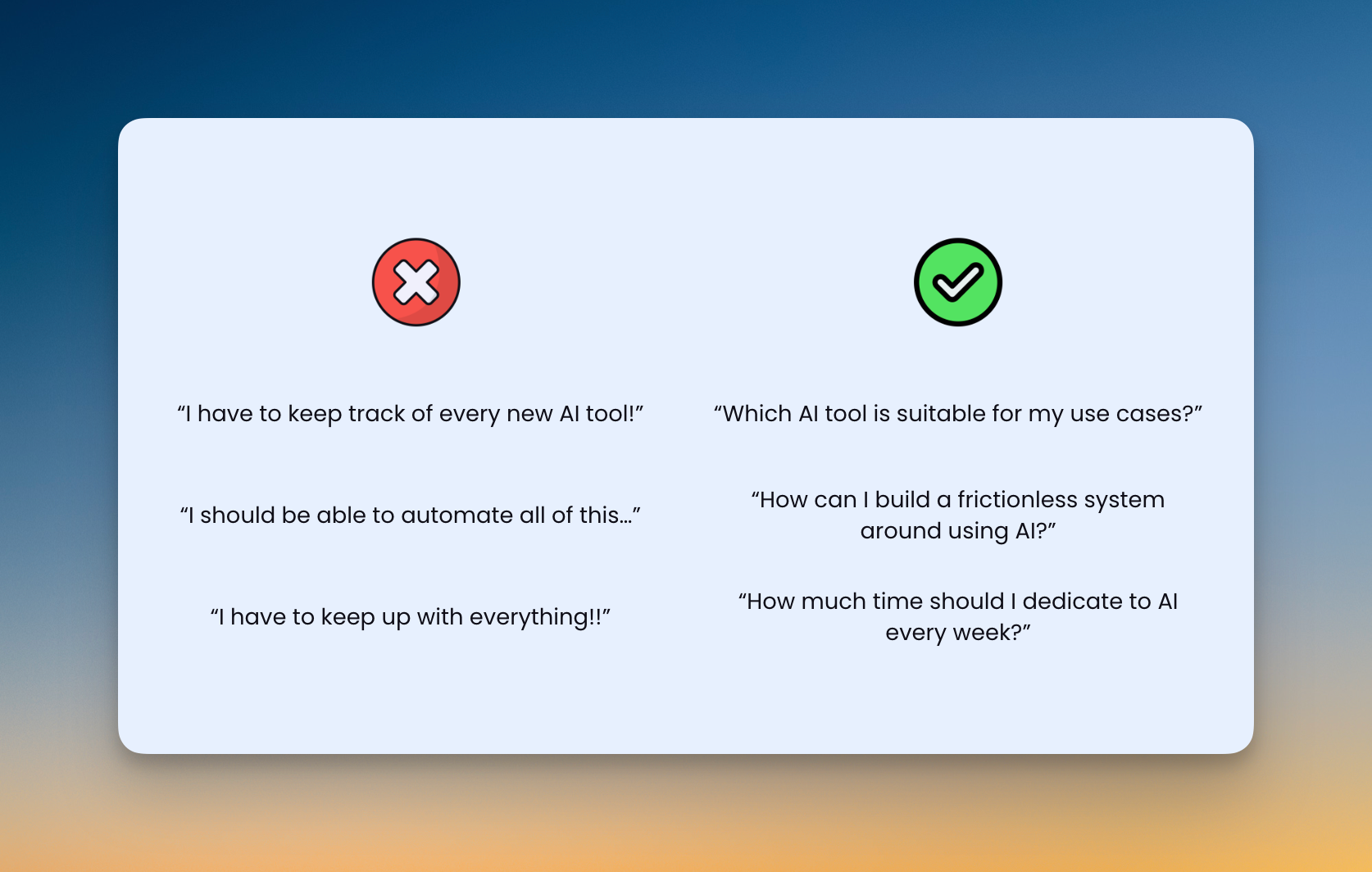AI
First things first: If you don't have a technical background and are looking to stay ahead in the world of AI, I recommend signing up for my free AI Toolkit and watching my AI playlist on Youtube. In my completely unbiased opinion that's the fastest way to start learning practical applications of AI.
The AI world can feel like a wild jungle for the average working professional; full of hype, confusion, and constant change. It's easy to feel lost and overwhelmed.
That being said, here are a few basic principles (and their corresponding implications) that I believe will stand the test of time:
Principle 1: Start with the Problem, Not the Tool
With so many new AI tools (and features) emerging daily, it's tempting to get caught up in the hype and start trying them all out. But this is a mistake.
- Case in point: When OpenAI announced Custom GPTs, they convinced many developers to spend time creating GPTs by making a big deal about monetization via the GPT Store. And yet, very little progress has been made.
Here’s what I recommend
The next time you come across a flashy tool or a new feature update, ask yourself these three questions:
- What problem does this tool solve?
- Who’s currently using it? Are they in my peer group?
- Where would it fit within my current workflow?
If you find that the answers don’t align with your core needs, it’s likely a distraction rather than a value-add.
Put simply: Once you’ve identified a problem that AI can help you solve, then you can start looking for the right tool for the job. And in my experience, the AI tools from one of the large tech companies is more than enough for the majority of our needs (e.g. use Gemini + Google Sheets to analyze data instead of a specialized AI data analysis platform).

My AI toolkit
- General purpose: Google Gemini and ChatGPT (I lean more towards Gemini due to its integration with Google Workspace applications)
- Copywriting: Claude
- Research: Perplexity
- Edge use cases: Midjourney, Google’s ImageFX, Eleven Labs, Runway
Principle 2: Think Augmentation, Not Automation
More and more, we’re seeing headlines that declare AI can automate almost any task and AI agents will soon replace human workers.
In reality, not only are autonomous AI agents a long way off, but there aren’t that many practical, fully-automated use cases for the everyday person either.
Don’t get me wrong: There are amazing tools like Make.com and Zapier AI that allows you to technically set up automations like generating a LinkedIn post every single day, but the outputs are simply not good.
For most of us, the time we invest to create an automation using AI tools isn’t worth the reward (for now anyways).
Here’s what I recommend
When it comes to leveraging AI for repetitive tasks, think “augmentation” instead of “automation.” For example:
- Every week, I’m responsible for summarizing project recap emails for the leadership team. I spent ~30 minutes creating and testing a prompt that turns recap emails into bite-sized snippets with just the headlines.
- By (1) Creating the prompt and (2) Inserting the prompt within my weekly workflow, I’ve drastically cut down the amount of time I need to spend on this one task.

Could I come up with a fully automated workflow given enough time? Probably.
But is what I have right now “good enough”? Definitely.
Principle 3: Sustainable Learning Through Consistency
The AI landscape is constantly changing, so it's important to stay up-to-date on the latest developments. But this doesn't mean you have to spend hours every day reading AI news and trying out new tools.
Here’s what I recommend
The key to sustainable learning is consistency. I have a daily and weekly routine when it comes to learning about AI -
- Daily: I subscribe to one (yes, just 1) AI-focused newsletter that gives me the latest headlines.
- Weekly: I spend 30 minutes once a week taking action on what I learned about AI that week (this could be trying out a prompt I saved, or diving deeper into a new use case or tool).
By just dedicating a small amount of time each week to learning about AI, we can stay ahead of the curve without feeling overwhelmed.
